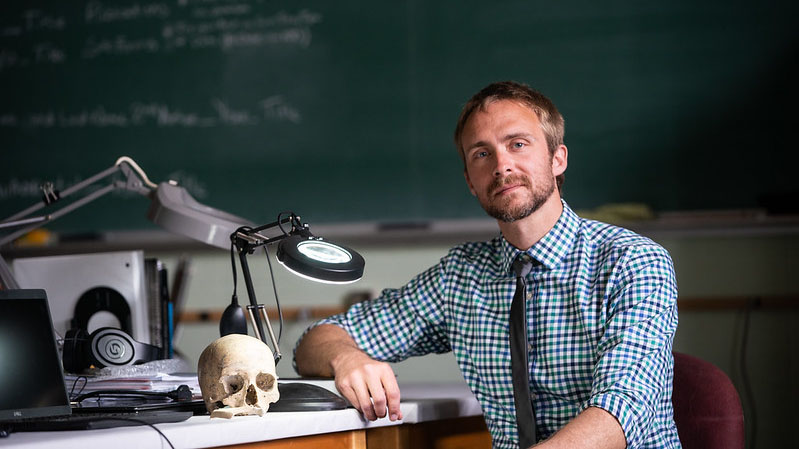By Chandler Brindley
A University of Wisconsin Oshkosh anthropology professor and his students will be taking on a cold case from 1992 revolving around the disappearance of a Fox Valley woman.
Jordan Karsten, an associate professor of anthropology at UW Oshkosh, hosts the Cold Case: Frozen Tundra podcast with Matt Hiskes, a friend and communications and media specialist.
Karsten and Hiskes’s podcast will feature the Laurie Depies case that is nearing 30 years unsolved after receiving permission from both the Depies family and Wisconsin Department of Justice.
“I think what we’ve already done with announcing the podcast has helped with publicizing the case,” Karsten said. “She went missing in what will be 30 years ago and if we can put a podcast out there that people want to listen to and view the details of the case, it allows for people who are paying attention to be more familiar with what happened.”
Depies, then 20, disappeared on Aug. 19, 1992, after driving to her boyfriend’s apartment in what is now Fox Crossing after leaving the Fox Valley Mall where she was working.
Depies’ friends reported hearing her drive into the parking lot of the apartment, but never saw her, only to find a cup on the top of the locked car that she was driving.
About 18 years later, there was a possible breakthrough in the case when Larry Hall confessed to killing Depies and said he buried her body in a remote place in southern Wisconsin. But investigators could never prove Hall, a suspected serial killer who is currently incarcerated at a North Carolina federal prison for a 1993 kidnapping and murder, killed Depies.
Karsten said research has begun again on the case, which is very complex.
“It’s a complicated case,” he said. “She basically disappears after pulling into a parking lot and never comes to the door of the apartment.”
In the first season of Karsten and Hiskes’ podcast, they concentrated on the Starkie Swenson case from 1983. In September 2021, hikers found Swenson’s remains in High Cliff State Park.
Karsten said he was very happy that he was able to help with the Swenson case, even if it was a small part.
“I think people were interested in what happened to Starkie Swenson,” he said.. “I think that people are very much interested in what happened to Laurie Depies.”
Although the Depies case is nearing 30 years old, Karsten is hoping that the podcast can generate some thought and provoke information from a possible source of information.
“You don’t know how or if that might hit home with somebody in a way in which they might remember something that they never turned in or never told anybody about back when it happened,” Karsten said. “They might realize now that it might be pertinent information and the publicity will generate some kind of usable lead for law enforcement.”
The case has gotten a lot of coverage in local radio, TV and newspapers, but Karsten thinks that the podcast will be helpful because its longer form in contrast to broadcast media.
“I think that the podcast is useful because it is longer form,” Karsten said. “You can present a lot of information over a series of episodes that really gets into the details, in one place and in order, with a set of details that hopefully will be useful for people who just might come forward with information.”
Similar to the Swenson case, Karsten will also have interested students assist him with this case. Some will be volunteers, although Karsten said he will likely also have some students helping out through independent study.
“Right now we’re trying to get organized and have some ideas for students to get involved,” Karsten said. “I have a group of students who want to get involved in research. I have some areas where they’ll be able to help out.”
The podcast will be available this summer at https://www.frozentundrapodcast.com/.




